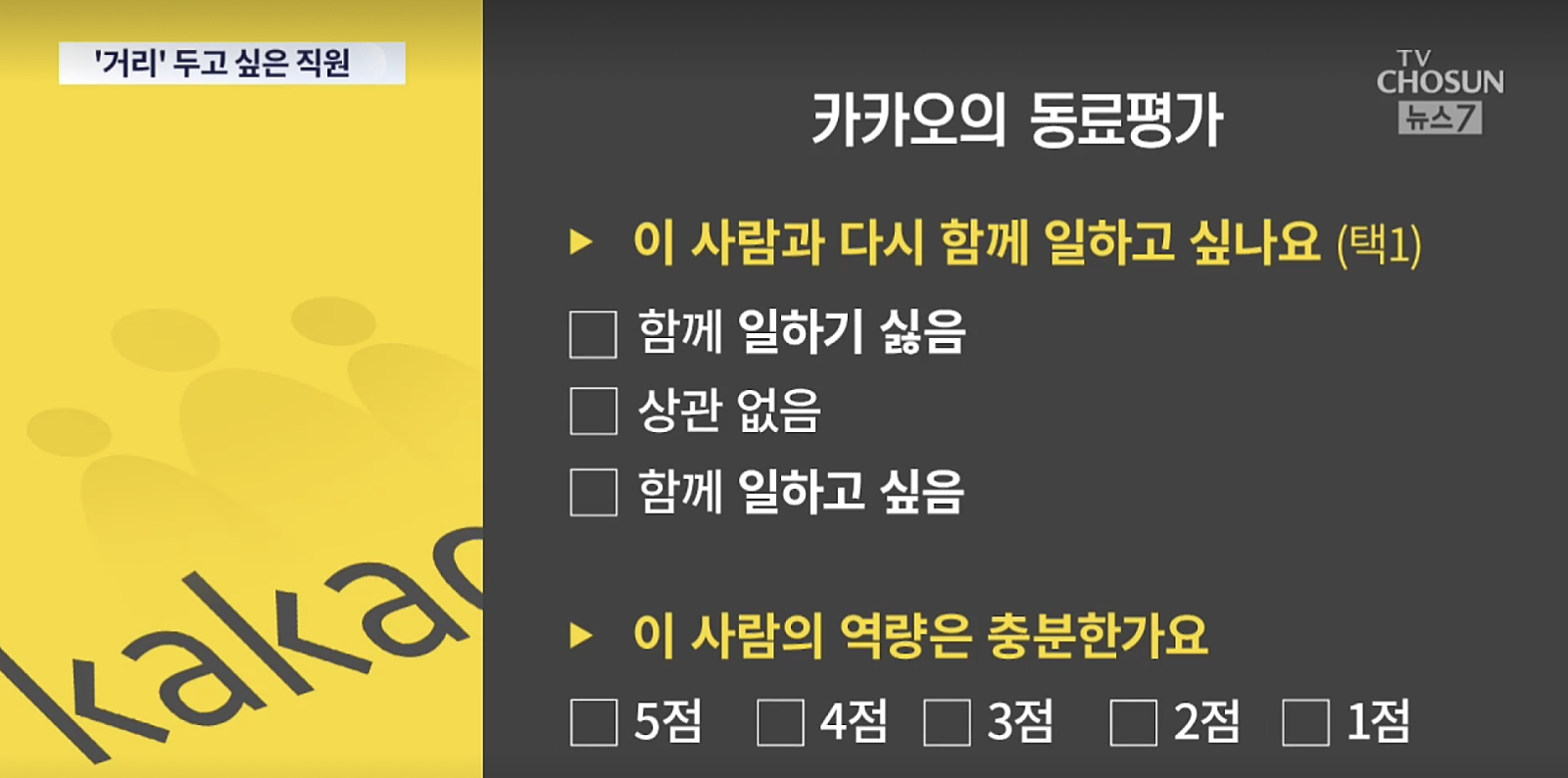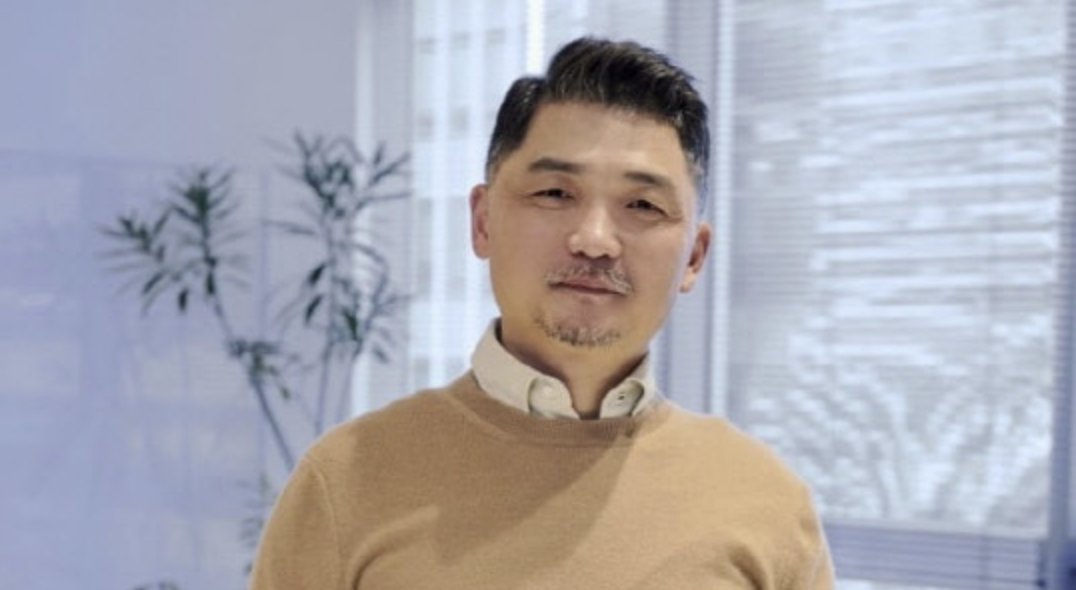A suicide note from a user believed to be a Kakao employee was posted on ‘Blind’, an anonymous community app for office workers. The next day, revelations criticizing Kakao's personnel evaluation method called ‘Peer Review’ surfaced, and it quickly became the subject of controversy. Peer reviews are used in academia for experts to evaluate the research of their peers authenticating the findings before publishing the results. This culture gradually spread to tech companies in Silicon Valley and was eventually adopted by some Korean companies. Peer reviews are oriented towards horizontal relationships. Therefore, they have the advantage of being able to deliver honest feedback to colleagues regardless of rank. Despite the benefits, I strongly oppose to Kakao's peer review system. Korean society is not ready for this type of system and the survey questions alone, leave room for misleading interpretations.
 |
| ▲ The faultily designed survey is a problem that has caused enough dissatisfaction among employees and only created distrust between colleagues. (Photo from TV Chosun News) |
First, Korean society is not ready for a peer review system. Up until now, the evaluation method in Korean companies has been a one-sided, top-down approach, where a boss evaluates a subordinate's work or individual competency. This form of evaluation has been viewed as the driving force moving the entire organization forward. However, they have often become obstacles for progress in a company rather than providing a fresh and efficient impetus for development of an organization. The peer review system emerged as a potential solution to the problems with the existing top-down evaluation method, as a way of emphasizing fairness. However, this method is impossible to operate without communication and empathy from your peers. In Korean society, with a long-established system of hierarchy, a horizontal system offers an unfamiliar practice and makes employees feel diffident to their superiors. In the end, it is hard for employees to feel comfortable freely expressing their opinions. In fact, some employees argued they were disadvantaged by the peer review information their bosses shared with the top organizers. In addition, if peer evaluations are leaked, it can lead to workplace harassment.
Second, the peer review survey questions provide misleading results with no opportunity for follow up. The survey asked “Do you want to work with this person again?” Colleagues can answer this question by choosing from “Yes”, “No”, “It doesn’t matter”, and “I’m not sure.” The data summarizes how many people said yes, etc. as compared to the company average. Kakao introduced this question for the first time in 2016 and began disclosing the results to the subjects in 2019. This information is tantamount to telling an employee they do not fit into the company very well. It places emotional pressure on employees by revealing only numerical values, when the reason why an employee does not want to work with someone is even more problematic than the simplistic responses they have to choose from. A person can be evaluated based on individual preferences, instead work capabilities. The faulty designed survey is a problem that has caused enough dissatisfaction among employees and only created distrust between colleagues.
Kakao's public relations team does not believe there is a problem with the peer review process. "It's one of the many options for evaluating colleagues," said an official from the public relations team. "We provide detailed and transparent data to all employees on evaluation methods and questions, and we receive opinions on improvement from time to time," he said. He later added, "When conducting an evaluation survey, employees respond that feedback is the most effective advice for them,” and “The evaluation is provided anonymously, and the question itself is not directly related to compensation and an employees’ evaluation grade." Despite these justifications, Kakao made a commitment to improve its evaluation process after receiving feedback from employees at a staff meeting on March 2. They stressed that various measures are being taken to prevent so-called workplace bullying and harassment, including the operation of an anonymous hotline, the addition of new reporting channels and limiting the results disclosure to employees causally related to the data. After a thorough review of employee concerns about the survey, the company will decide whether to eliminate the problematic questions, reword them, or opt not to disclose the data to the related parties.
 |
| ▲ Kakao's public relations team does not believe there is a problem with the peer review process. Kim Bum-soo, chairman of the Kakao Medical Association.(Photo from Kakao) |
When considering this matter, one could ask, is it the responsibility of the company to comfort a wounded employee? The most important thing you can earn in a company is the respect of your colleagues. It doesn't help to simply ask someone’s feelings about working with a coworker and just provide the person with the numbered results. It leads the appraised person to wonder, "What did I do wrong?" and "Who said that he or she didn't want to work with me?" Neither questions left unanswered will help with the growth of the individual, as well as the team or company.
The reason for evaluating colleagues is to give healthy feedback instead of unexplained criticism. The goal is to offer useful help by suggesting ways in which colleagues can grow together. When we give feedback and show respect for others, any criticism will be accepted as legitimate and it will be taken on as a means to develop ourselves in the workplace. Without including a form of respect into the evaluation process, a numbered system of unexplained criticism is just another source of workplace harassment and it must stop.
김건희 dankookherald@gmail.com

 Vote for the Campus Brand Naming!
Vote for the Campus Brand Naming!

![[Campus Magnifier] Let's Surf the Library!](/news/thumbnail/202404/12496_1765_4143_v150.jpg)




